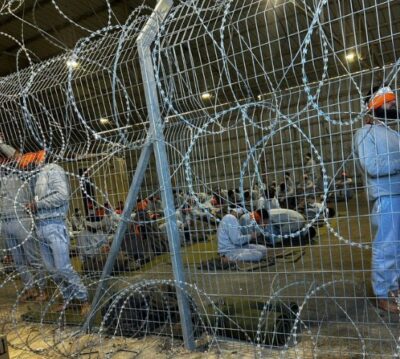The Palestinian Prisoners’ Society (PPS) has reported a significant and unprecedented rise in the number of detainees suffering from skin diseases, particularly the highly contagious scabies disease, in Israeli prisons, detention centers and interrogation facilities, and that there have been cases of other contagious skin diseases that the detainees were unable to identify.
According to recent visits conducted by lawyers, and testimonies from recently released detainees, dozens of cases have been observed, specifically in the Negev and Megiddo prisons, as well as in the Ofer and Ramon prisons.
These conditions are worsened by the lack of necessities, such as cleaning materials, limited access to water, and restricted showers.
It is worth noting that since the beginning of the aggression on Gaza, the Israeli Prison Authority has confiscated all detainees’ belongings, including their clothes.
Presently, the detainees rely on a single spare change of clothes, and overcrowding in the various prisons has reached alarming levels due to the escalation of daily abductions.
There is also a lack of ventilation, and the detainees are isolated in cells without any exposure to sunlight, which greatly contributes to the spread of diseases.
The Prisoners’ Society has highlighted that the prison administration continues to perpetrate systematic medical crimes by deliberately refusing treatment to detainees, despite their deteriorating health conditions.
Furthermore, the Israeli Prison authorities are also intentionally transferring infected individuals from one section to another, and to other prisons, leading to a surge in the number of infections.
It is important to note that among those affected are children who are specifically held in Megiddo Prison.
The PPS emphasized that the Israeli occupation has not only subjected detainees to various forms of torture, abuse, deprivation, and starvation but has also transformed every aspect of their detention life into a means to further inflict torture and abuse.
This includes exploiting the detainees’ need for medical treatment by denying them their right to receive proper care.
Before October 7, 2023, detainees already faced significant delays in accessing even the most basic medical treatment, and many have died as a result, but now they are subjected to even more severe and egregious medical crimes compared to previous stages of the ongoing war of extermination, the PPS added.
The PPS also warned that if the current retaliatory measures, such as beatings and abuse, continue at their current rate and the detainees remain imprisoned for extended periods, the health conditions of sick detainees will deteriorate further.
Obvious signs of health issues have started to emerge among the detainees, making it challenging for specialized institutions, including human rights groups, to accurately count and document all cases, particularly with the ongoing daily arrest campaigns targeting the sick, wounded, and elderly.
The PPS said the abusive policies observed by institutions in recent months are part of a long-standing and systematic pattern, which the Israeli prison system has been practicing for decades.
These policies are not new; rather, their intensity and level have varied over time, reaching a point where it is impossible to predict the extent of brutality that the occupation system, including the prison system, is capable of inflicting.
The Prisoners’ Society raised concerns about the increasing number of detainees due to the ongoing systematic procedures and policies implemented by the occupation. These practices are aimed at inflicting more harm and suffering on the detainees, leading to chronic diseases that are difficult to treat.
In a previous statement, the Palestinian Prisoners’ Society highlighted that a majority of released detainees suffer from physical and psychological health issues. One of them, Farouq Al-Khatib, has died because of prolonged medical neglect while detained.
The PPS, once again, called upon international human rights institutions, particularly the United Nations, to act on ending the serious Israeli crimes and violations against the Palestinian detainees.
It said that “human rights groups and institutions must go beyond their limited role of monitoring and documenting testimonies, and issuing reports and positions, but instead, they should play a more active role in addressing the occupation’s criminality and brutality. This is crucial, especially considering the new stage we are facing.”
It is important to note that the Negev and Megiddo prisons are among the largest prisons, housing thousands of detainees.
The number of detainees has doubled since the start of the ongoing genocide war on October 7, 2023.
As of May 2024, the number of detainees exceeds 9,300; however, this figure does not include all detainees from Gaza, whose numbers are estimated to be in the thousands.

